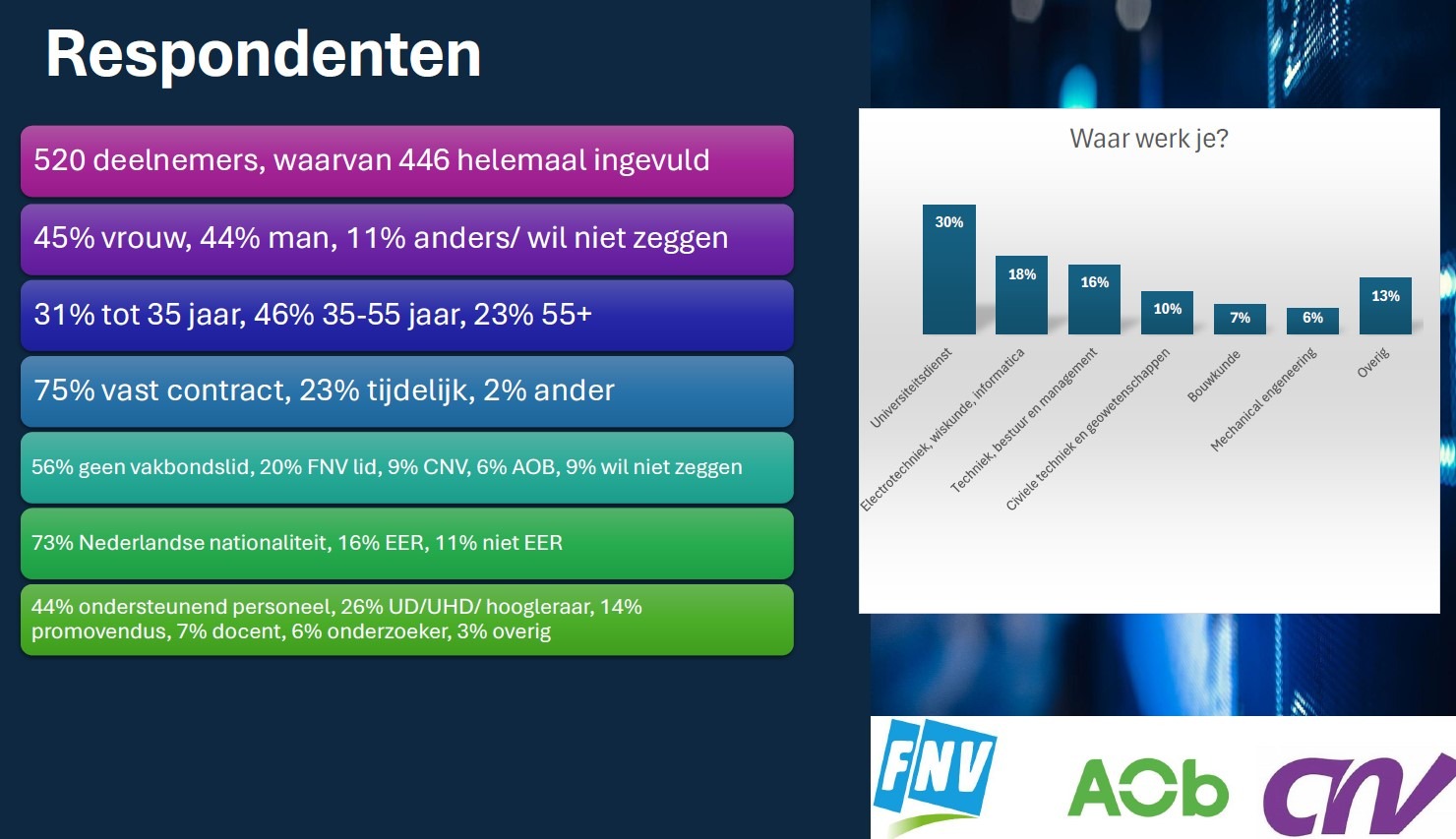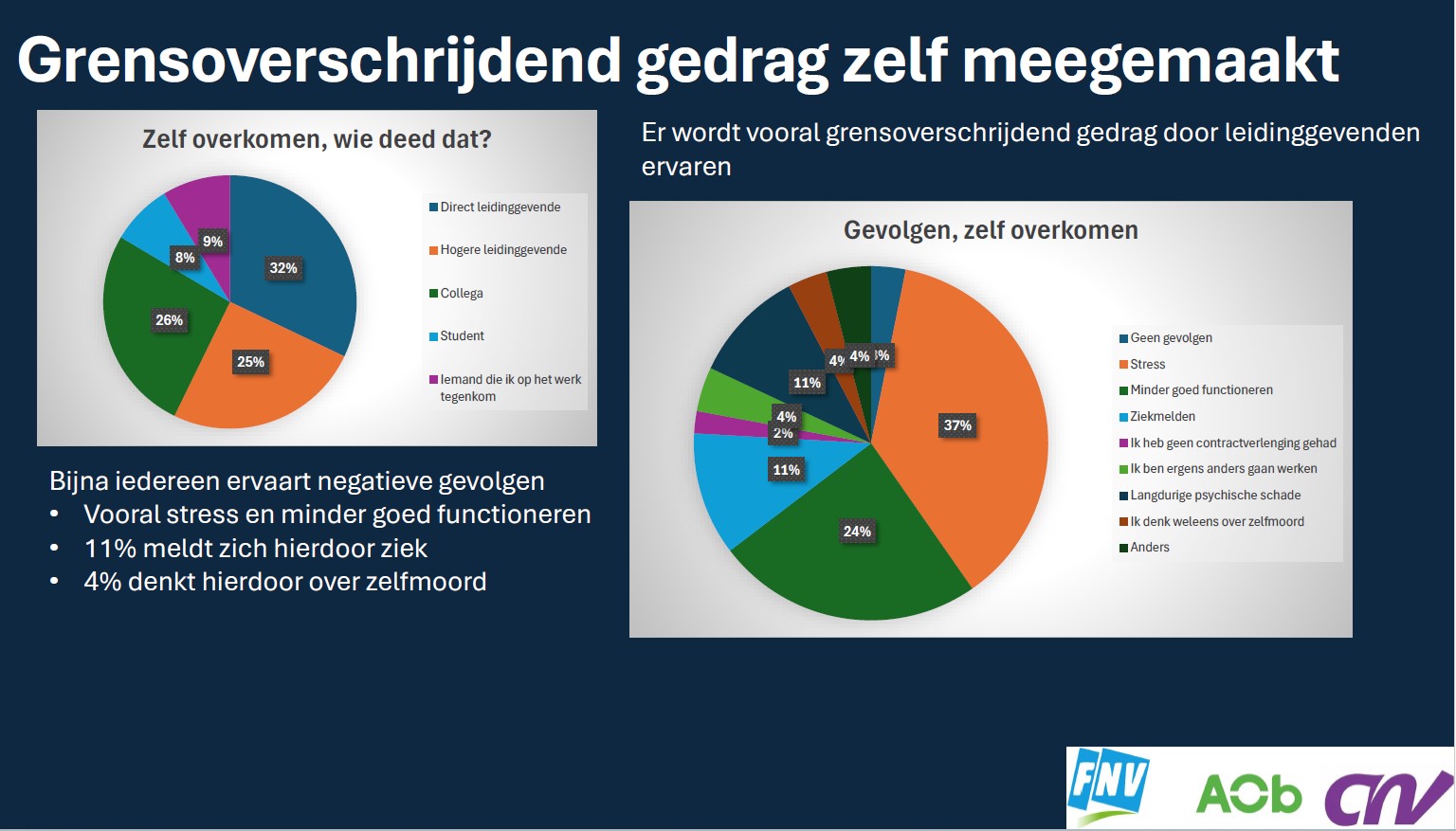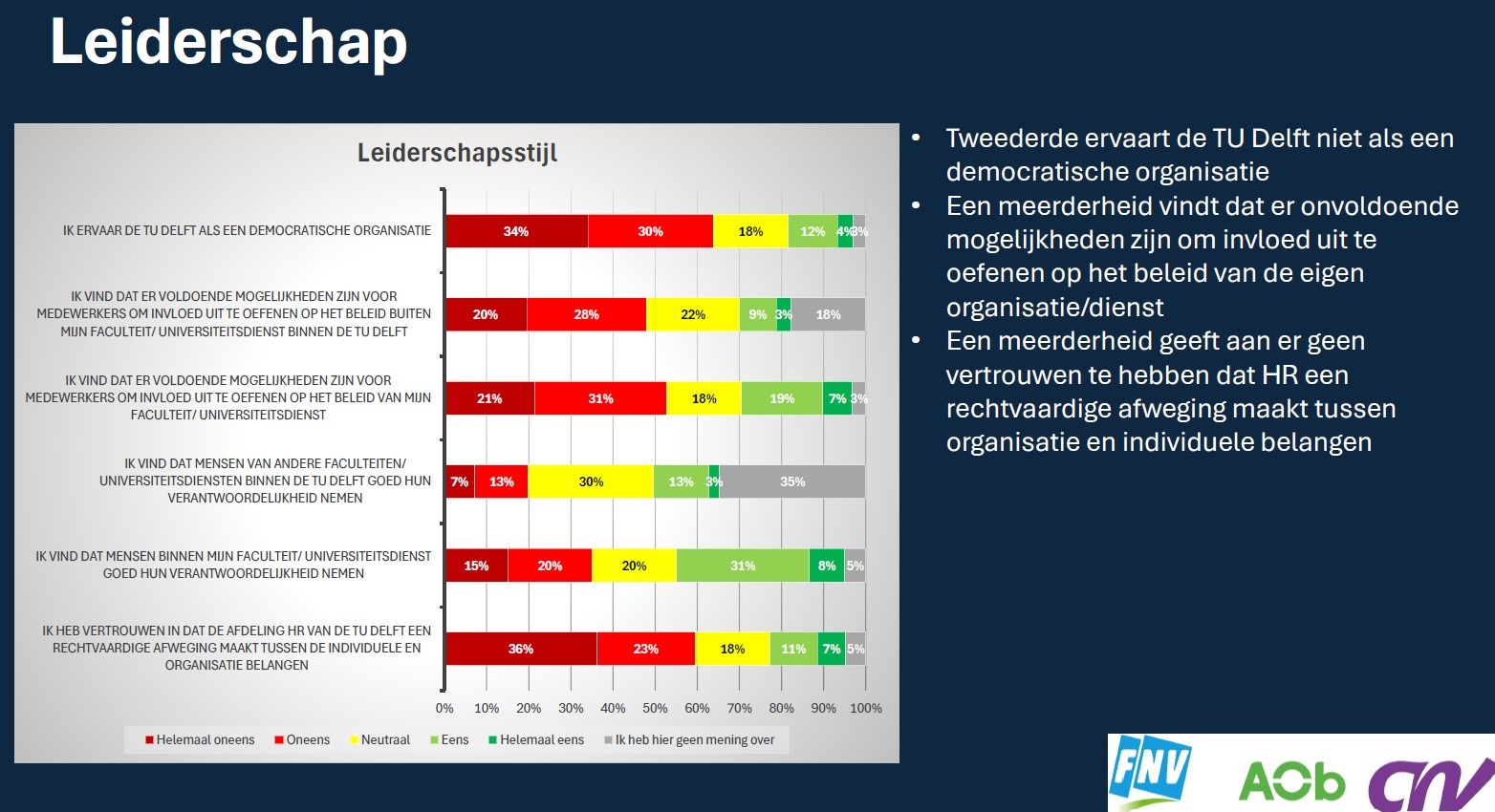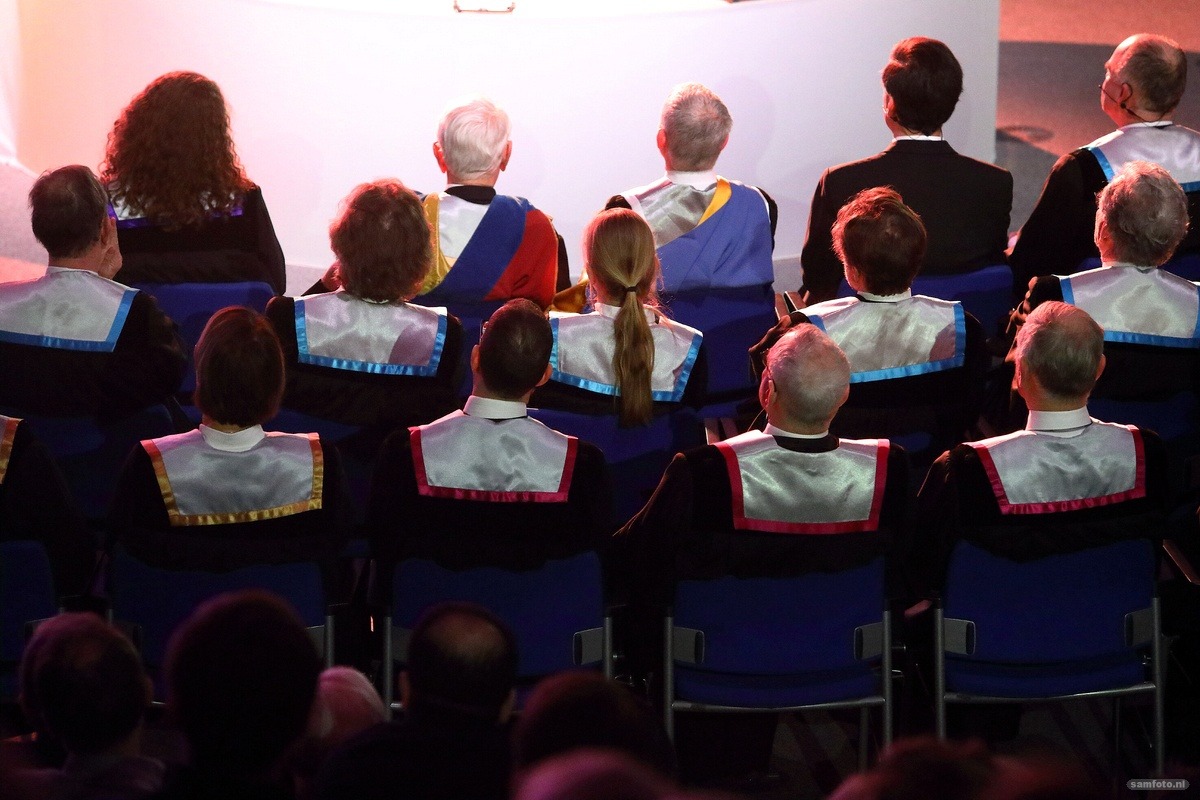Dies 2025. (Photo: Sam Rentmeester)
New survey results show that employees at TU Delft still face major problems. The unions presented the findings of their questionnaire on social safety on Monday. The way they did so caused irritation.
43% of the respondents experienced one or more types of transgressive behaviour last year. They were mostly related to bullying, intimidation and discrimination. 80% of them claimed that it happened more than once. They said that the perpetrators of unacceptable behaviour were often their direct (32%) or higher (25%) managers. 54% feel socially safe and 32% do not.
These are the findings of a questionnaire among employees at TU Delft that was available for filling in for three months and was filled in by 520 people. The outcomes are dire for managers, the Human Resources Department and the Executive Board. FNV member José van Lieshout expressed her dismay several times at the Local Consultation Body meeting of the trade unions and the Executive Board on Monday morning 12 May. The national Veilig en Gezond Werken (safe and healthy work) policy advisor attended to present the survey outcomes to the Executive Board.
Reduced performance
The survey showed that experiencing transgressive behaviour often leads to stress (37%) and lower performance (24%). Van Lieshout points to the 4% who say they sometimes think about suicide after what happens at work. “This equates to 16 people,” she stresses. “I was shocked. People do not see a way out anymore. I push for us to learn to recognise these symptoms and to talk about it. We always refer people to 113 Zelfmoordpreventie (suicide prevention hotline).”
37% are thinking about finding another job
The interpersonal interaction at TU Delft is sometimes so unpleasant that 37% are thinking about finding another job. 22% are even thinking about leaving academia altogether. The situation at other universities is comparable. In 2024 the Netherlands Labour Authority found once again that all universities experienced high workloads and the lack of social safety.
The text continues under the image.

Not supported
The survey also showed that employees do not feel supported (83%) if they experience transgressive behaviour. This reflects the main conclusion of the Inspectorate of Education last year that employee welfare is not managed properly. The Inspectorate called this mismanagement.
In the open answers, the respondents cited several reasons for this: the Supervisory Board protects the Executive Board; the organisation mostly supports managers; those filing reports are accused of creating unrest; problems are not solved; managers do not take responsibility; and, there is no aftercare.
Little confidence in the leadership
In the eyes of the respondents, there is much amiss with the management. The higher the managers are in the hierarchy, the less the confidence in them. 55% trust the management of their own supervisors, 33% in that of the management of their own faculty or service, and 9% in that of the Executive Board.
62% do not think that undesirable behaviour is dealt with properly
66% of the respondents say that they are familiar with the procedures related to undesirable behaviour, but only 16% is satisfied with these procedures and other policies. 62% do not think that undesirable behaviour is dealt with properly. 57% believe that the management at TU Delft does not set a good example.
The text continues under the image.

Not heard
Almost two thirds (64%) of the respondents say that they do not experience TU Delft as a democratic organisation. This is also reflected in other answers. Only 12% think that employees have enough means to exert influence at TU Delft level. This is 26% in their own faculty or service. Only 18% have confidence that HR ‘properly weighs up the individual and the organisational interests’.
‘You cannot disband the hierarchy, but you can make people better heard’
The trade unions also want to see change on this point. In her presentation, Van Lieshout advises the Executive Board to ‘list the sources of the lack of social safety’, such as the lack of being heard and the hierarchical relationships. “You cannot disband the hierarchy, but you can make people better heard.”
Discussion about the methodology
After the presentation, there was a discussion about the methodology of the trade unions. It is standard practice to share documents in advance of the regular consultation meetings between the internal trade unions and the Executive Board. But Executive Board member Marien van der Meer saw the findings for the first time on Monday morning. Before the presentation, she warns that it means that she cannot go into them in depth. After the presentation she says that “I am shocked by the findings. I do not want people to not feel supported. And that they think about suicide is the last thing you want.”
Van der Meer says that she would have preferred to have had the findings earlier so that she could consult and prepare a proper response. “That would be appropriate, given the importance of the subject.” When it transpires that the trade unions have already issued a press release, she raises her eyebrows. The spokesperson and the Manager of the Integrity Office, Olivier Seuer, also react with surprise. The former says that “This just makes the lack of clarity worse.” “In relation to diligence, this is not good. It makes the lack of social safety even worse,” Seuer adds.
The text continues under the image.

All three want to know why the unions opted to issue a press release so quickly and not work together as they do more often. The unions state that there was also no collaboration on the part of the Board. They are unhappy that they were not allowed to share the questionnaire on the intranet and on other TU Delft channels.
After the meeting, the trade unions tell Delta the reason behind their haste. The findings were only available for a couple of days, but the national trade unions made the internal trade unions present them on Monday. Given the importance of the survey, the national trade unions deemed the next consultation meeting too far away (7 July).
Representation
The number of respondents at 520 was questioned during the meeting. It is, after all, a small proportion of the more than 7,500 employees. Van der Meer also thinks this. “The number of respondents represents 6% of the total staff body. People could also fill in the questionnaire more than once and it could also be filled in by non-employees. We need to look at this carefully.”
‘The findings are not nice, but they are not surprising’
Afterwards, the Chair of the unions in the Local Consultation Body, Fred Veer, worked out that to his mind the outcomes are representative. “Two hundred and fifty union members filled in the questionnaire. This is 30% of the total. And an almost equal number of non-union members gives a clear picture.” On top of this, the findings are in line with what the unions have been seeing for years, says Veer. “We talk to a lot of people who experience the lack of social safety. The findings are not nice, but they are not surprising.”
TU Delft’s reaction
Later on Monday 12 May, TU Delft circulated a response.
‘TU Delft has taken note of the outcomes of the survey that the unions prepared. The outcomes give a worrying picture of social safety. This is not what we want as a community. It shows that we have a lot of work to do to ensure that people from all levels of the TU Delft campus feel safe, welcome and valued. This process will take more time than we would like. Change does not happen overnight, but haste is needed. We are working hard on a change in culture, and will continue to do so.
Lees meerTo this end, the ‘social safety and integrity reporting point’ was opened recently and supervisors are being trained in increasing social safety in their teams. We are also working on a new code of conduct. A lot of staff members and students are involved in this process and dialogue sessions are currently being held. Further, everyone is welcome to express their opinions about the new Code of Conduct and to work together to create a safe, connected community.
TU Delft sees that social safety is also an important issue for the unions. There is continuous close consultation on this subject and this helps us move forward.
More details about the many initiatives that are and are being designed to improve social safety are available in the Plan of Execution (in Dutch) and the quarterly report (in Dutch). Also read our special web page about social safety.”
So what were the Inspectorate’s findings again?
The Inspectorate of Education investigated transgressive behaviour at TU Delft from December 2022 to November 2023. In the resulting report, the investigators speak of intimidation, racism, sexism, bullying, exclusion, gossiping, social insecurity due to lack of leadership and a culture of fear, among other things. For instance, employees are said to be afraid to voice their opinions and hold each other accountable for behaviour.
The effects among TU Delft employees who have reported to the inspection are often long-lasting and hampering. The inspectorate speaks of psychological and physical health complaints, absence from work and a general feeling of insecurity. Stress, burnout, depression and PTSD, crying and tense home situations also occur, as do illness, vomiting at work, panic attacks and heart palpitations.
The inspectorate reports that TU Delft’s university administration has a lot of information regarding what is happening in terms of social safety, but that they ‘omit to add everything up so as to create a complete picture’. ‘The management’ also ‘does not adequately manage in terms of appropriate measures’. The Inspectorate believes that this is mismanagement.
Read the news and background articles on the Inspectorate’s report in our dossier.
Do you have a question or comment about this article?
s.m.bonger@tudelft.nl




Comments are closed.